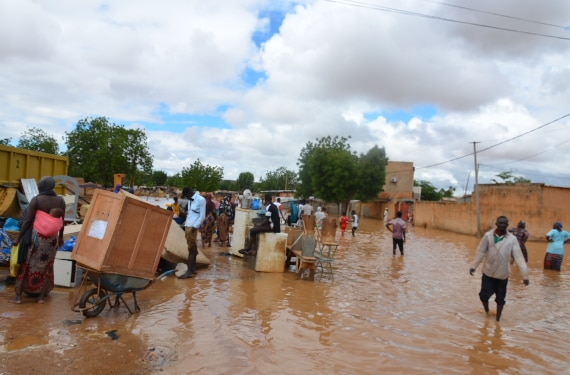The portable gardens helping Niger’s pastoral community build resilience
Simple materials and techniques can support pastoralists in Niger facing difficult choices.
Niger is facing a complex humanitarian emergency. Continuous violence and insecurity has been compounded by endemic poverty, food insecurity, demographic pressure, epidemic challenges and climate shocks.
Climate impacts include increasingly erratic rainfall patterns, drought, windstorms, higher temperatures and periods of heavy rainfall leading to flooding and rapid soil erosion. This is having a major impact on the natural grasslands, resulting in the spread of the desert and the loss of soil fertility.

Niger, along with the rest of the Lake Chad Basin, also suffers from chronic drought. Temperatures are rising gradually while rainfall in this semi-arid area is becoming increasingly unpredictable. There have been several severe droughts since 1973, causing massive loss of livestock.
Climate change in this context is seen as a threat multiplier, particularly for Niger’s nomadic pastoralist community, who make up around 20% of the total population. Nomadic communities have reduced resilience to adapt, particularly financially, to climate threats, and drought is especially damaging as they traditionally follow the seasonal rains. Their main source of livelihoods – livestock – is also at risk.
Many pastoralists are facing difficult choices. To be viable today, transhumant pastoralism means moving further over longer distances to find pasture, with more need for cross-border transhumance. Increased competition for water and access to grazing lands can also lead to rising tension and conflict amongst communities.
Nomadic communities have reduced resilience to adapt, particularly financially, to climate threats, and drought is especially damaging as they traditionally follow the seasonal rains.
In response, and in collaboration with a number of local partners, CARE launched the Mobile Kitchen Garden program, which teaches women how to grow vegetables in portable bags, clay or wooden trays. As part of the programme each recipient receives five empty bags (each has 50-100 kg capacity), and approximately 200 grams of seeds.
Ilgamoutt Moudda, 30, said that when she was first introduced to the programme she didn’t understand how to produce lettuce, cabbage or other vegetables when she and her family were constantly on the move. “We are nomads, constantly looking for pasture for our animals,” she says. “I have never seen, nor known nor practiced market gardening, let alone eaten these types of market garden products.”
She says the program convinced her otherwise, offering training in effective planting methods and how to provide proper nutrition for the soil with scant use of water and soil.
“Today, I produce lettuce and cabbage and we even manage to dry the cabbage leaves for later use in cooking,” says Ilgamoutt. “This year, thanks to the vegetables we were able to grow in our portable containers, my husband got to buy less grain in the market because we now have this produce to supplement our diet. From now on, we won’t go anywhere without our vegetable containers,” she adds.

In 2019, 200 vulnerable pastoral households were supported through the program. The material and techniques used are simple and the containers are easy to carry as the families travel. This means they can plant nutritious vegetables for themselves and their children in a fast cycle, allowing them to both feed their children and sell what they cannot eat. Such knowledge is crucial in areas where the soil is particularly dry and barren.
Hadjara Oumarou, 32, lives in the village of Boundou Sodji and is married with six children. She says there has been a change in her way of thinking; whereas before, she only saw vegetables and plants in neighboring countries when they were migrating, she now has vegetables in her house all the time.
“At the moment, I have two containers that are full of vegetables,” says Hadjara.
“Every day I can take whichever type I feel like and prepare it for the whole family, including the neighbors who are very interested in this food with high nutritional value. We have diversified our diet, we have reduced our expenses used for the purchase of cereals, and we sell less of our livestock to meet our family’s needs.”
To learn more about CARE’s programmatic work in climate change, adaptation and resilience follow us on Twitter. To learn more about CARE’s climate and resilience work in Niger, see here or follow CARE West Africa on Twitter.
